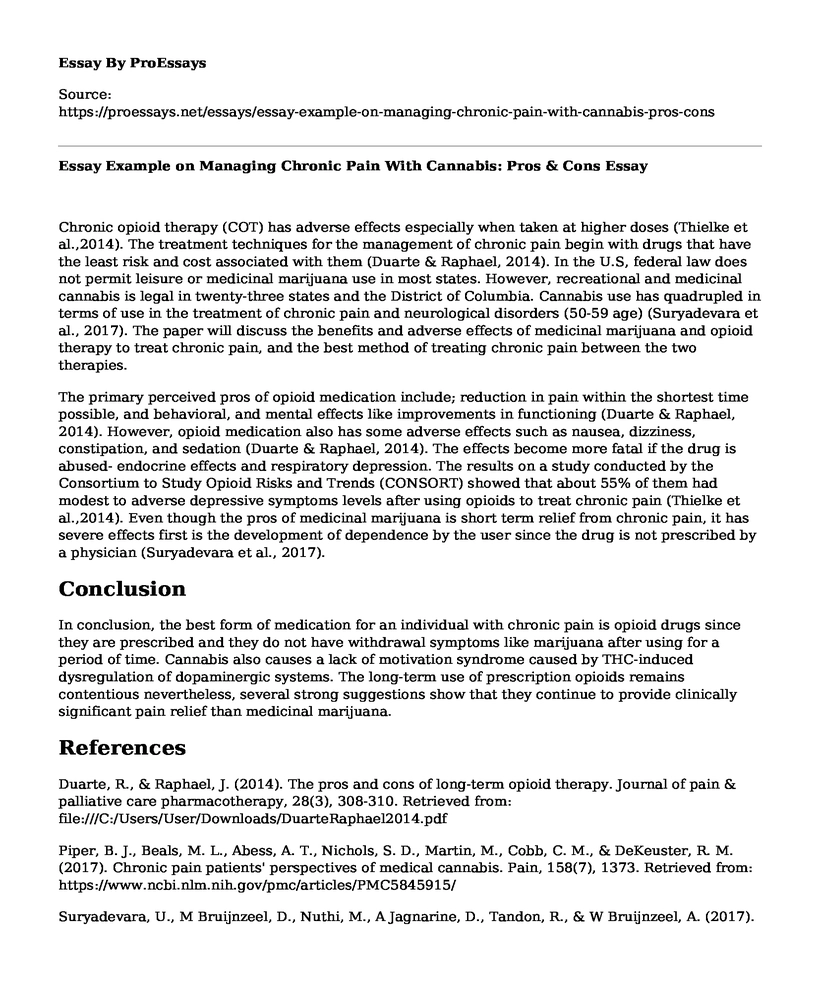Chronic opioid therapy (COT) has adverse effects especially when taken at higher doses (Thielke et al.,2014). The treatment techniques for the management of chronic pain begin with drugs that have the least risk and cost associated with them (Duarte & Raphael, 2014). In the U.S, federal law does not permit leisure or medicinal marijuana use in most states. However, recreational and medicinal cannabis is legal in twenty-three states and the District of Columbia. Cannabis use has quadrupled in terms of use in the treatment of chronic pain and neurological disorders (50-59 age) (Suryadevara et al., 2017). The paper will discuss the benefits and adverse effects of medicinal marijuana and opioid therapy to treat chronic pain, and the best method of treating chronic pain between the two therapies.
The primary perceived pros of opioid medication include; reduction in pain within the shortest time possible, and behavioral, and mental effects like improvements in functioning (Duarte & Raphael, 2014). However, opioid medication also has some adverse effects such as nausea, dizziness, constipation, and sedation (Duarte & Raphael, 2014). The effects become more fatal if the drug is abused- endocrine effects and respiratory depression. The results on a study conducted by the Consortium to Study Opioid Risks and Trends (CONSORT) showed that about 55% of them had modest to adverse depressive symptoms levels after using opioids to treat chronic pain (Thielke et al.,2014). Even though the pros of medicinal marijuana is short term relief from chronic pain, it has severe effects first is the development of dependence by the user since the drug is not prescribed by a physician (Suryadevara et al., 2017).
Conclusion
In conclusion, the best form of medication for an individual with chronic pain is opioid drugs since they are prescribed and they do not have withdrawal symptoms like marijuana after using for a period of time. Cannabis also causes a lack of motivation syndrome caused by THC-induced dysregulation of dopaminergic systems. The long-term use of prescription opioids remains contentious nevertheless, several strong suggestions show that they continue to provide clinically significant pain relief than medicinal marijuana.
References
Duarte, R., & Raphael, J. (2014). The pros and cons of long-term opioid therapy. Journal of pain & palliative care pharmacotherapy, 28(3), 308-310. Retrieved from: file:///C:/Users/User/Downloads/DuarteRaphael2014.pdf
Piper, B. J., Beals, M. L., Abess, A. T., Nichols, S. D., Martin, M., Cobb, C. M., & DeKeuster, R. M. (2017). Chronic pain patients' perspectives of medical cannabis. Pain, 158(7), 1373. Retrieved from: https://www.ncbi.nlm.nih.gov/pmc/articles/PMC5845915/
Suryadevara, U., M Bruijnzeel, D., Nuthi, M., A Jagnarine, D., Tandon, R., & W Bruijnzeel, A. (2017). Pros and cons of medical cannabis use by people with chronic brain disorders. Current neuropharmacology, 15(6), 800-814. Retrieved from: file:///C:/Users/User/Downloads/Pros_and_Cons_of_Medical_Cannabis_use_by_People_wi.pdf
Thielke, S. M., Turner, J. A., Shortreed, S. M., Saunders, K., LeResche, L., Campbell, C. I., ... & Korff, M. V. (2014). Do patient-perceived pros and cons of opioids predict sustained higher-dose use?. The Clinical journal of pain, 30(2). Retrieved from: https://www.ncbi.nlm.nih.gov/pmc/articles/PMC3805783/
Cite this page
Essay Example on Managing Chronic Pain With Cannabis: Pros & Cons. (2023, Feb 27). Retrieved from https://proessays.net/essays/essay-example-on-managing-chronic-pain-with-cannabis-pros-cons
If you are the original author of this essay and no longer wish to have it published on the ProEssays website, please click below to request its removal:
- Hypertension Case Study
- Deceptive Social Media Advertising of Pharmaceutical Products - Coursework Example
- Essay Sample on Nursing and Mental Health Rotation
- Essay Sample on Iom Future of Nursing: Improving Health & Leading Change
- Proposal to Reduce Organ Shortage and Curb the Organ Black Market
- Essay Example on Gut Bacteria and Diabetes: Examining the Link
- Essential Resuscitation Equipment and Drugs for In-Hospital Cardiopulmonary Arrests - Essay Sample







